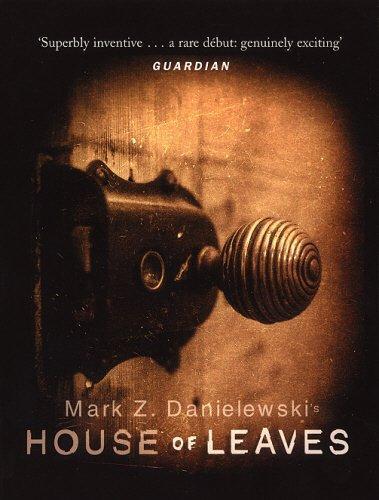Review of 'House of Leaves' on 'Goodreads'
4 stars
This is amazing. There are two narratives here, the book itself and another, squeezed haphazardly in the footnotes. I felt torn between the two narratives the whole way, impatient with the one as I was waiting to get back to the other.
The first one is by a man known as Zampanò, whose prose is exquisitely Lovecraftian. Speaking as someone who's actually reading Lovecraft at the same time, I'll say that this echoes those of his works which are most disturbing. And I mean that in the best way possible.
In between and among Zampanò's book is the other narrator, Johhnny Truant (the one who ostensibly "found" Zampanò's work), whose words are just... beautiful. Well, I say "beautiful." Mostly I mean the language is fascinating, even if what the words mean is anything but beautiful. It is a masterpiece of... not quite stream of consciousness, but nearly. Wandering, barely-connecting thoughts, …
This is amazing. There are two narratives here, the book itself and another, squeezed haphazardly in the footnotes. I felt torn between the two narratives the whole way, impatient with the one as I was waiting to get back to the other.
The first one is by a man known as Zampanò, whose prose is exquisitely Lovecraftian. Speaking as someone who's actually reading Lovecraft at the same time, I'll say that this echoes those of his works which are most disturbing. And I mean that in the best way possible.
In between and among Zampanò's book is the other narrator, Johhnny Truant (the one who ostensibly "found" Zampanò's work), whose words are just... beautiful. Well, I say "beautiful." Mostly I mean the language is fascinating, even if what the words mean is anything but beautiful. It is a masterpiece of... not quite stream of consciousness, but nearly. Wandering, barely-connecting thoughts, but with punctuation, and occasionally coherence. It's so wandering, and full of black-ish whimsy. I love it. It's art, pure and simple.
Seriously, this book is like a Film - with a capital F, mind you - or like a goddamn surrealist avant-garde museum exhibit. Sometimes the words are upside down or backwards or slanted; often they make shapes on the pages (shapes which match the action or echo the mood); whole sentences are drawn out over several pages for effect. Everything means something, you're pretty sure - unless it doesn't, and you're just reading too much into it. Two thirds of the way through, and the storyline(s) just fell apart in my hands, crumbling into glorious madness.
And once having finished... I felt wrung out to dry.
I just... I wish he'd stop saying "alot." All I see is that bit from Hyperbole and a Half.

